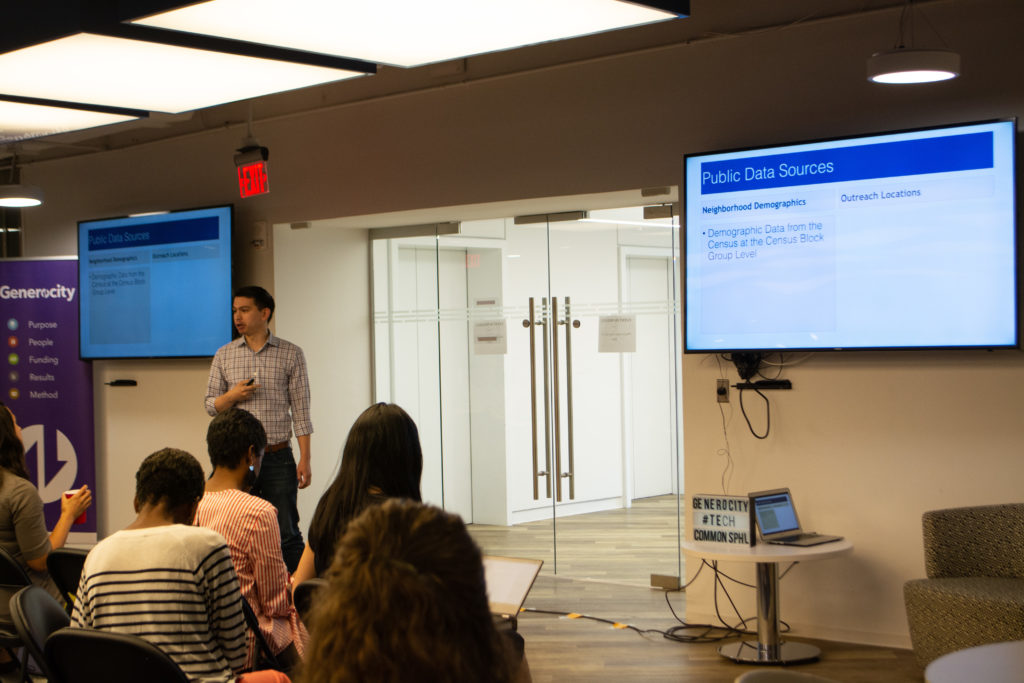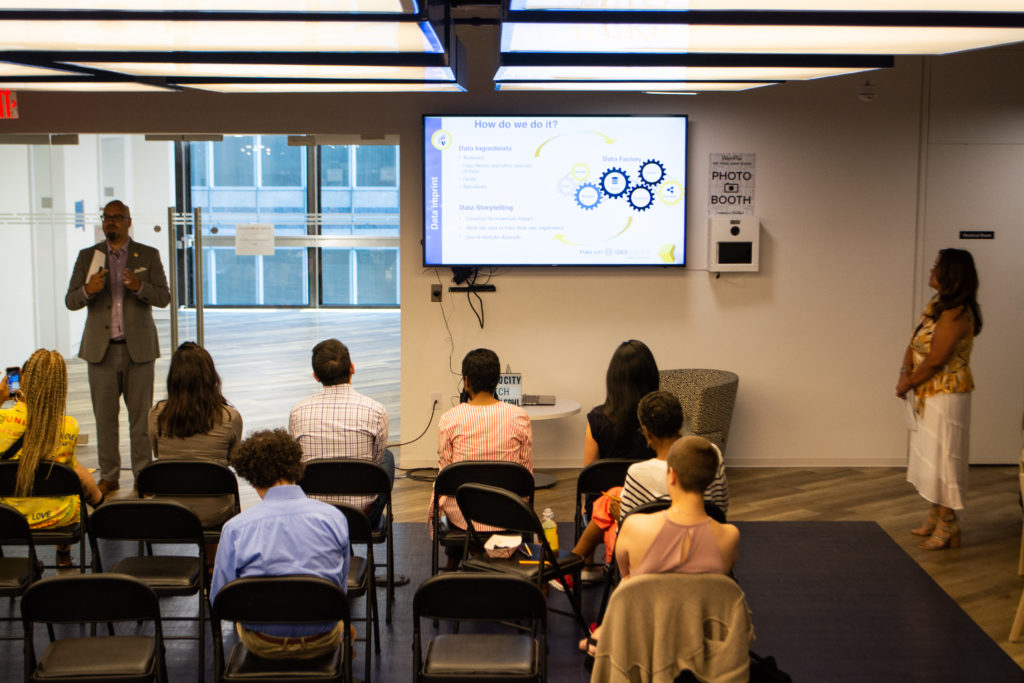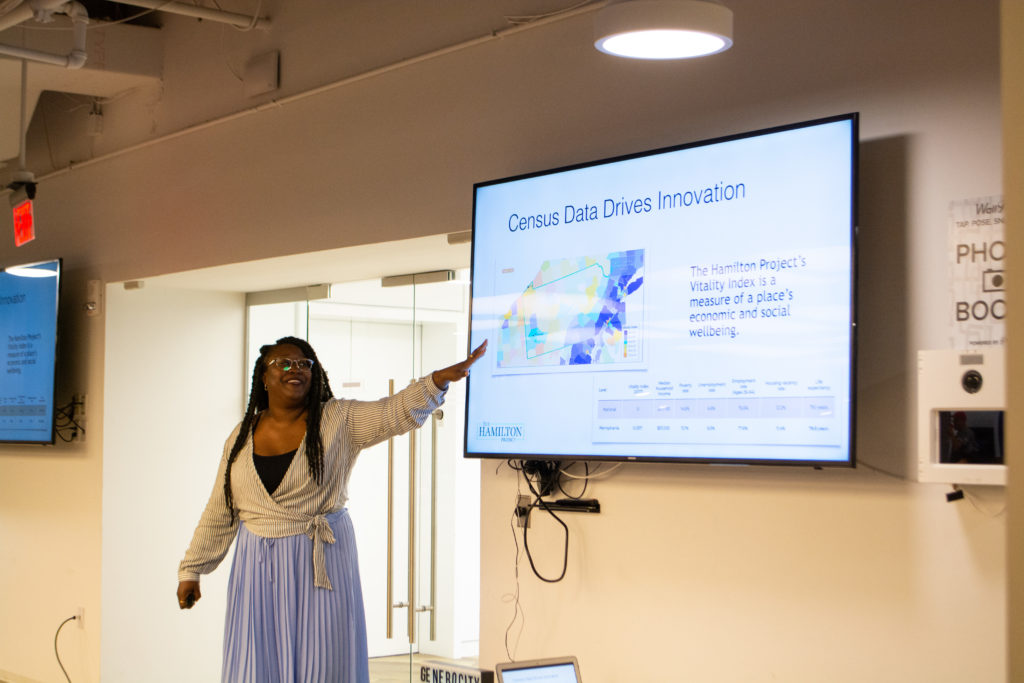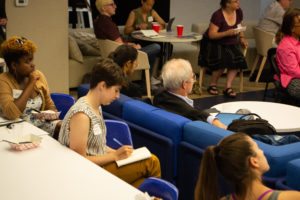At Tech in the Commons, nonprofit pros learned about using data to maximize impact
 June 28, 2019
Category: Featured, Medium, Purpose
June 28, 2019
Category: Featured, Medium, Purpose
Tech in the Commons, Generocity‘s third annual free reporting and event series on digital engagement strategies for place-based nonprofits, returned on Wednesday, June 26 for its first session of 2019.
The session, hosted at MakeOffices and supported by Comcast NBCUniversal, focused on ways to use census data to improve access to resources and education and strengthen data storytelling.
In 2020, for the first time, the U.S. census will mostly be conducted online, with 80 percent of households initially receiving an invitation to submit their responses over the internet. This puts marginalized communities, many of which experience the impact of the digital divide, at risk of being underrepresented in the count.
Inaccurate census records prevent local nonprofits from identifying pressing gaps in education, housing, food and income security and access to healthcare, impeding them from adequately serving communities in need.
The speakers at Tech in the Commons: Connect the Dots with Census Data shared resources and technologies they’re currently using in efforts to reach people in those groups.
After each presentation, attendees were invited to learn more and get feedback on their own ideas in small breakout sessions led by each speaker.

Alex T. Williams, of Internet Essentials, shows how he uses census data to decide which local schools could use help bolstering their digital access. (Photo by Khanya Brann)
In his role as senior manager of data analytics for Internet Essentials at Comcast, which provides affordable, high-speed internet to families with low incomes, Alex T. Williams uses census data to decide which local schools could use help bolstering their digital access.
In his presentation, he illustrated how he used the data to identify neighborhoods that have the lowest broadband adoption rates, the schools located in those areas and which of those schools has the highest percentage of students qualifying for reduced lunch.
After analyzing those findings, the team at Internet Essentials brainstorms the best approach to bridge the access gap, like through school partnerships and laptop donations.

Ricardo and Rosa Torres, of Vereti Concepts, demonstrate how data can connect a nonprofit’s mission with its impact. (Photo by Khanya Brann)
During her presentation with Ricardo Torres, co-runner of their data visualization consulting firm Vereti Concepts, Rosa Torres demonstrated how using census data can help nonprofits develop compelling data storytelling that illustrates the connection between their mission and their impact.
“I believe in the power of data storytelling to inform and engage people,” Torres said. “It’s a crucial part of making data more accessible.”
With Data Imprint, a service she created under Vereti in 2017, Torres said she helps nonprofits explore, “How does your data make your mark? How does it tell a story? How does it make an impact?”
Data goes beyond one-dimensional numbers and bar graphs, she said.
“When I think of data for social change, I don’t see data on charts,” she said. “I see human stories behind every data point.”
This was the first Tech in the Commons Event Dennis Boylan, COO of Delaware Board of Trade, a fully-automated trading platform, and president of the Logan Square Neighborhood Association, has attended.
Boylan said he was intrigued by the creative ways people are incorporating data into their work and would be able to draw from ideas introduced during the presentations in both of his roles.
“When the Comcast presenter talked about using census data and overlaying it on Zillow, I thought, ‘There’s an interesting way to hybrid it,’” he said. “You can take two different commercial tools you wouldn’t normally associate with each other and put them to good use.”

Ijanae “Izzy” Jackson, the founder of Dwell City Solutions, highlights the ways in which census data can drive innovation for social change. (Photo by Khanya Brann)
Ijanae Jackson is the founder of Dwell City Solutions, a web-based risk management platform that uses predictive analytics to identify when tenants will need financial assistance, with the goal of helping landlords reduce risk and eviction.
Jackson highlighted the ways in which census data can drive innovation for social change and how she uses data with Dwell City to explore tenants’ financial trends.
She said one of the overall takeaways from her presentation and the evening’s general theme is the crucial role technology plays in creating meaningful social change.
“Technology cannot be divorced from impact,” she said. “If you’re trying to make an impact on the community, you need to make sure you’re pairing it with tech and not leaving anyone behind.”
Project
Internet EssentialsTrending News











